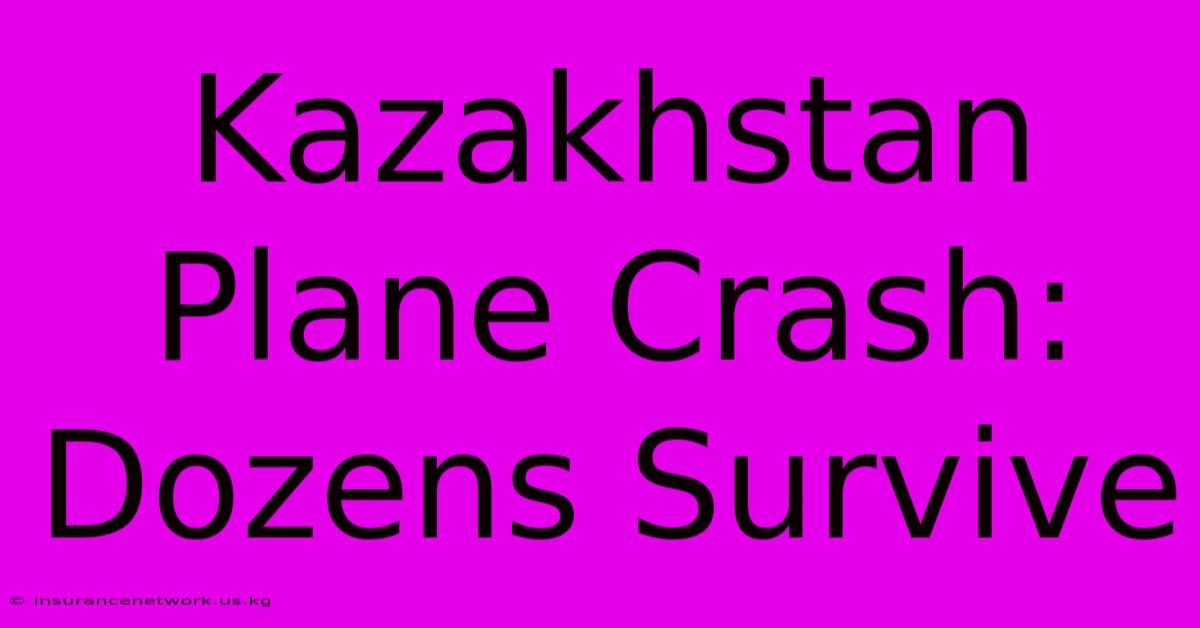Kazakhstan Plane Crash: Dozens Survive

Discover more detailed and exciting information on our website. Click the link below to start your adventure: Visit Best Website insurancenetwork.us.kg. Don't miss out!
Table of Contents
Kazakhstan Plane Crash: Dozens Survive Miraculously
A horrific plane crash in Kazakhstan has shocked the world, but against all odds, dozens of passengers and crew survived the devastating impact. The incident, which involved a Bek Air Fokker 100, has sparked intense investigations into the cause of the accident and highlighted the remarkable resilience of the human spirit in the face of tragedy.
The Crash: A Scene of Chaos and Survival
The Bek Air flight, carrying passengers from Almaty to Nur-Sultan, crashed shortly after takeoff on December 27, 2019. Eyewitness accounts describe a scene of utter chaos as the plane plummeted from the sky, striking a concrete building before coming to a rest in a field. The impact was severe, resulting in significant damage to the aircraft and causing numerous injuries. Images and videos circulating online depict the wreckage and the frantic rescue efforts.
The Survivors: Stories of Resilience
While the death toll remains a somber reminder of the gravity of the situation, the number of survivors stands as a testament to both luck and the quick response of emergency services. Dozens of individuals walked away from the wreckage, although many sustained serious injuries. Stories of heroism and survival have emerged from the crash site, highlighting the bravery of passengers and crew who assisted in the rescue efforts. Many survivors described the terrifying moments leading up to the impact and the incredible feeling of relief upon escaping the mangled aircraft.
Investigating the Cause: Uncovering the Truth
The Kazakh authorities have launched a comprehensive investigation to determine the exact cause of the crash. Preliminary reports suggest potential mechanical failures, but a thorough examination of the flight data recorders (black boxes) and a detailed analysis of the wreckage are crucial to uncovering the truth. International aviation safety experts are involved in the investigation, ensuring a thorough and transparent process. The investigation will focus on several key aspects, including:
- Aircraft maintenance: A comprehensive review of the aircraft's maintenance history is underway.
- Pilot error: Investigators will examine the actions of the pilots leading up to the crash.
- Weather conditions: The role of weather conditions at the time of takeoff will be carefully considered.
Impact on Aviation Safety
The Bek Air crash will undoubtedly have a significant impact on aviation safety standards in Kazakhstan and globally. The findings of the investigation will likely lead to changes in safety protocols and regulations, potentially impacting aircraft maintenance procedures, pilot training, and other crucial aspects of flight operations. The incident serves as a stark reminder of the inherent risks associated with air travel and the importance of prioritizing safety.
Aftermath and Recovery
The aftermath of the crash has been marked by both grief and resilience. Families of the victims are grappling with the loss of loved ones, while survivors are receiving medical treatment and support. The Kazakh government has pledged to provide assistance to the victims and their families and has emphasized its commitment to improving aviation safety. The crash has prompted a renewed focus on the importance of thorough aircraft maintenance, rigorous pilot training, and strong safety oversight.
The Road to Recovery: Lessons Learned
The Kazakhstan plane crash serves as a tragic reminder of the fragility of life and the importance of continuous improvement in aviation safety. The investigation and its findings will undoubtedly shape future safety regulations and practices, helping to prevent similar tragedies from occurring in the future. The resilience shown by the survivors and the determination of investigators to uncover the truth offer a glimmer of hope amidst the devastation. The world watches as Kazakhstan navigates this challenging period and works to learn from this devastating event. The focus now shifts to ensuring that this tragedy serves as a catalyst for positive change in aviation safety, globally.

Thank you for visiting our website wich cover about Kazakhstan Plane Crash: Dozens Survive. We hope the information provided has been useful to you. Feel free to contact us if you have any questions or need further assistance. See you next time and dont miss to bookmark.
Featured Posts
-
Baltimore Houston Game Live Score 23 2
Dec 26, 2024
-
Azerbaijan Jet Crash Kills Dozens In Kazakhstan
Dec 26, 2024
-
Doncic Exits Game Mavericks Lose
Dec 26, 2024
-
No Swift At Kelces Steelers Game
Dec 26, 2024
-
Phoenix Suns Christmas Day Victory
Dec 26, 2024
